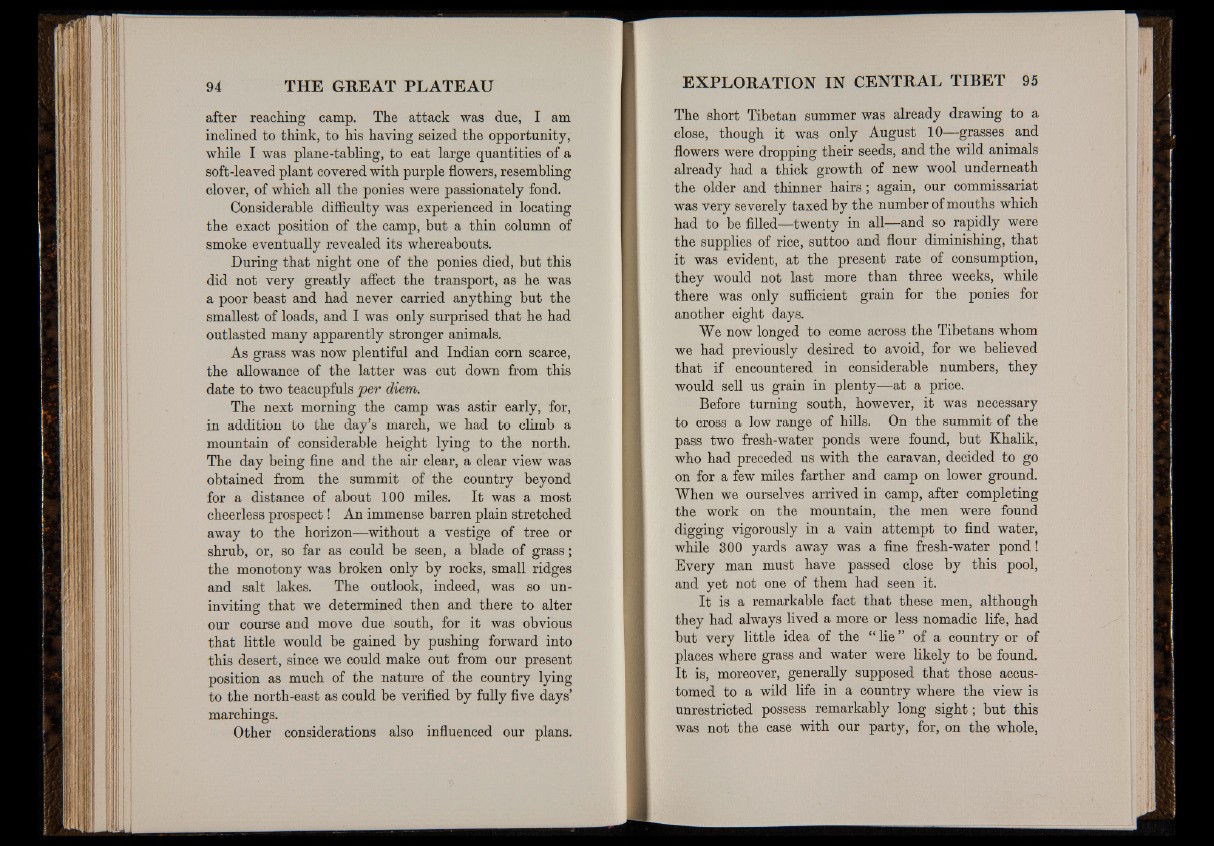
after reaching camp. The attack was due, I am
inclined to think, to his having seized the opportunity,
while I was plane-tabling, to eat large quantities of a
soft-leaved plant covered with purple flowers, resembling
clover, of which all the ponies were passionately fond.
Considerable difficulty was experienced in locating
the exact position of the camp, but a thin column of
smoke eventually revealed its whereabouts.
During that night one of the ponies died, but this
did not very greatly affect the transport, as he was
a poor beast and had never carried anything but the
smallest of loads, and I was only surprised that he had
outlasted many apparently stronger animals.
As grass was now plentiful and Indian corn scarce,
the allowance of the latter was cut down from this
date to two teacupfuls per diem.
The next morning the camp was astir early, for,
in addition to the day’s march, we had to climb a
mountain of considerable height lying to the north.
The day being fine and the air clear, a clear view was
obtained from the summit of the country beyond
for a distance of about 100 miles. It was a most
cheerless prospect! An immense barren plain stretched
away to the horizon—without a vestige of tree or
shrub, or, so far as could be seen, a blade of grass;
the monotony was broken only by rocks, small ridges
and salt lakes. The outlook, indeed, was so uninviting
that we determined then and there to alter
our course and move due south, for it was obvious
that little would be gained by pushing forward into
this desert, since we could make out from our present
position as much of the nature of the country lying
to the north-east as could be verified by fully five days’
marchings.
Other considerations also influenced our plans.
The short Tibetan summer was already drawing to a
close, though it was only August 10—grasses and
flowers were dropping their seeds, and the wild animals
already had a thick growth of new wool underneath
the older and thinner hairs; again, our commissariat
was very severely taxed by the number of mouths which
had to be filled—twenty in all—and so rapidly were
the supplies of rice, suttoo and flour diminishing, that
it was evident, at the present rate of consumption,
they would not last more than three weeks, while
there was only sufficient grain for the ponies for
another eight days.
We now longed to come across the Tibetans whom
we had previously desired to avoid, for we believed
that if encountered in considerable numbers, they
would sell us grain in plenty—at a price.
Before turning south, however, it was necessary
to cross a low range of hills. On the summit of the
pass two fresh-water ponds were found, but Khalik,
who had preceded us with the caravan, decided to go
on for a few miles farther and camp on lower ground.
When we ourselves arrived in camp, after completing
the work on the mountain, the men were found
digging vigorously in a vain attempt to find water,
while 300 yards away was a fine fresh-water pond!
Every man must have passed close by this pool,
and yet not one of them had seen it.
It is a remarkable fact that these men, although
they had always lived a more or less nomadic life, had
but very little idea of the “ lie ” of a country or of
places where grass and water were likely to be found.
It is, moreover, generally supposed that those accustomed
to a wild life in a country where the view is
unrestricted possess remarkably long sig h t; but this
was not the case with our party, for, on the whole,